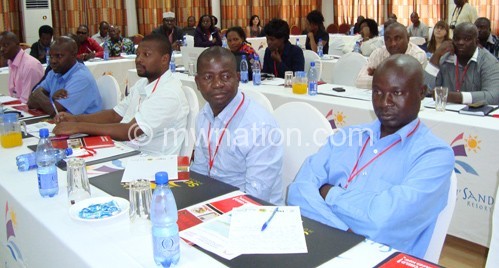CSOs, chiefs team up against child marriage

A two-day child marriage symposium held in Mangochi last week wound up with commitments and agreements from various stakeholders to revamp community policing structures and modify cultural practices that encourage child marriages.
The symposium, organised by Youth Net and Counselling (Yoneco) and Girls Empowerment Network Malawi (Genet) with support from Hivos, also agreed to translate into local languages and popularise laws that protect the welfare of children.
The idea to popularise the laws followed an observation from Willard Manjolo, a director of social welfare in the Ministry of Gender, who noted some laxity in the application of the Child Care, Protection and Justice Act (2010).
The meeting—which drew participants from the media, civil society organisations, faith communities, traditional leaders, Malawi Police Service and different ministries and departments of government—also noted the need to harmonise laws that talk of a minimum age of a child.
In her presentation, Grace Malera from the Malawi Human Rights Commission (MHRC) also expressed the need to have uniform laws.
“Generally, our laws are not talking to each other. On the minimum marriage age, they say one thing and another on child labour and who is eligible to vote,” said Malera.
In 2009, Parliament amended Clause 9 in the Constitution (Amendment) Bill revising the marriage age from 15 to 16 with over two third majority support.
The amendment caused uproar as most people felt the new age was still not adequate to give children time to mature and complete their education. This forced the former president the late Bingu wa Mutharika to refer the bill back to the ministry to address people’s concerns. The new draft bill is yet to be presented to Parliament.
But some experts, including Hivos programme manager Rebecca Mahlunge, said Malawi is likely to settle for the international Convention on the Rights of Child (CRC) marriage age of 18, more especially because it ratified CRC in 1991.
The stakeholders to the symposium have also committed themselves to finding ways of modifying some cultural practices, building capacity of parents and guardians on parenting skills, reintegrating and rehabilitating girls withdrawn from child marriages.
The Ministry of Gender has also pledged to finalise the child protection information systems and implementation as a measure to store data on child marriages.






your focus should be on how end poverty not cultural practices,thz practices hv a very smal efect compaired to poverty ,ndani akukuphimbani mmaso kut muzipanga misonkhano imeneyo,jst reveal to us that ur aim is to get alowances,meet the leaders and discus where is poverty comin from? what are govnent policies? are thz policies realistic or amakomela ochita bwino kale,? b strict on that osamangopha mutu mafumu kumawoneka ngati mukupanga zolondola apa.
Dear fellow reader,
The issue of poverty is a bit complex and its effects and causes are very diverse. In order to deal with poverty, we need to be a bit more sophisticated in our strategies otherwise we will end up supporting an enemy whom we think we are fighting against. Cure for any disease comes with the knowledge of that particular disease. People who only focus much on poverty in their efforts to alleviate it find themselves doing the antithesis of what they are advocating for. They end up fueling instead of eradicating. the system of trying to end poverty by marrying off young girls only increase the vulnerability of the girls, expose them to the risk of HIV infection, fistula and many other such ordeals. Here, does the poverty end or accelerate? Now, is it logical for right thinking people to let this happen to our little sisters and nephews just because we are so selfish and we want our poverty to end? we have to systematically identify the root causes first and tackle them not tackling the symptoms as you are suggesting. Child marriage is one major evil that dehumanizes young people and even if it stops fueling their poverty should we allow them to suffer just because we are poor and we are so obsessed with our poverty so much that their suffering is nothing as compared to our poverty?
Dealing with the things that fuel our poverty is the only ideal way we are going to get out of it bwana!